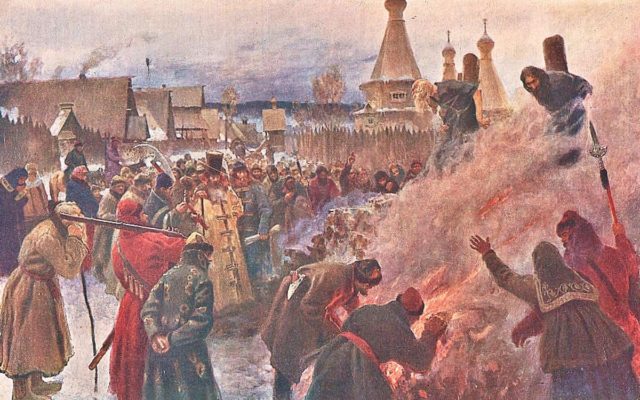On September 16, 1666, in the ancient city of Adrianople, Sabbatai Sevi, the reported Messiah of the Jewish people, converted to Islam. Although the event did not bring to a close the movement known as Sabbateanism, it did mark the decline of the last great messianic movement within Judaism. Scorned by Muslims and Christians alike, the Jewish populations of Europe and the Middle East, arguably, never quite recovered from the blow their “Mystical Messiah” dealt them. Meanwhile, over in the land of Russia, an archpriest named Avvakum was causing a bit of a stir himself. Steadfastly opposed to the liturgical reforms introduced by Patriarch Nikon of Moscow, Avvakum turned altering the Sign of the Cross and Slavonic orthography into an apocalyptic event. As the best known of those Russian Christians who would come to be known as “Old Believers,” Avvakum is credited with creating the first masterpiece of Russian literature: his frenzied, paranoid, and heterodox story of his life. Avvakum, unlike Sevi, had no pretense to being a messiah; he did, however, see himself as God’s agent in the world, the last of the saints who would hold fast to the spiritual, liturgical, and linguistic patrimony of the Russian Church in the face of torture and death. Having had enough of his antics, the Russian state burned Avvakum and three of his followers at the stake in 1682.
With the publication of Gershom Scholem’s monumental work on Sevi in the mid-20th century, a small but noticeable scholarly enterprise has been built up around this seminal figure in Jewish history. Scholem’s study, which eschewed a materialist explanation for Sevi’s popularity among the Jews of his day, has been met with equally compelling accounts that see, for instance, the origins of Sabbateanism in the plight of Eastern European Jewry in the 17th century. Others see in Sevi an opportunity for the Jews to abandon beliefs and practices which had made them stand apart for centuries. As a messianic figure, one of Sevi’s perceived tasks was to abolish the ritual law of the Jews before inaugurating a bloodless restoration of the Kingdom of Israel. Perhaps, some opine, Sevi’s appeal came about due to a general Jewish exhaustion of adhering to religious tenets that seemed to bring them nothing but misery for over 1,000 years. Whatever the reasons behind the growth and popularity of the Sabbatean movement, the final world has yet to be written about this delusional figure and the impact his life had on Jewish history.
And what about Avvakum? In the Anglophone world, Avvakum is typically only known by way of passing mention in Orthodox history books or the English-language translation of his autobiography. He is not, in the estimation of most Orthodox Christians, a figure to be revered. Yet there is an argument to be made that he is a figure who lurks behind any and all liturgical pedantry among the Orthodox, particularly the Russians. Avvakum’s great error, as many have pointed out, was to identify the Christian Faith with liturgical praxis. Avvakum, like almost all of his Russian contemporaries, did not realize that the Byzantine Rite, no less than any other approved rituals within the Universal Church, did not spring into being by way of a few strokes of a saint’s pen. The Byzantine Rite, as it was kept in Russia in the 17th century, was the byproduct of numerous revisions, redactions, and recensions—sprinkle on some scribal errors, obscure local practices, and a general ignorance of Church history and theology and what you have is a recipe for religious disaster. The Old Believer movement, though always a minority movement within the Orthodox Church, nevertheless caused a serious rupture within Russian Orthodoxy and arguably contributed to the eventual secularization of the Russian Orthodox Church by Tsar Peter the Great at the turn of the 18th century.
Today, the Jewish people are still waiting for a messiah while Russian Orthodox zealotry typically takes the form of militaristic nationalism rather than spiritually inspired apocalypticism. Might an argument be made that this tempering of what one might call the “religious spirit” is a sign that despite protestations to the contrary, secularism—with its inordinately positive appraisal of a certain type of rationalism—has, on some level, “won”? (Won what? I do not know.) The Jews, on the one hand, appear to have lost hope, or at least otherworldly hope, while the Christians of Russia, on the other, see their “mission” to the world materially rather than spiritually. Maybe this is for the best. After all, few good things, humanly speaking, befall those who get carried away by enthusiasms not easily measured empirically, and the sum total of the psychic and moral damaged caused by misplaced enthusiasms is likely incalculable. Still, their absence is decidedly felt, especially in a world where the surest cure for boredom is an iPhone.




January 9, 2018
I don’t doubt that secularism has won. I don’t know a single Christian, of any confession, who is willing to give up the slightest comfort for the Kingdom. Maybe they decided Hell is a fair payoff for freedom.
January 10, 2018
That seems to be David Bentley Hart’s argument in his Introduction to his New Testament translation.
January 10, 2018
Fr. John Whiteford calls it the “Hart Idiosyncratic Version” (I’m fairly sure the resulting acronym was deliberate). He thoroughly excoriates it here–
http://fatherjohn.blogspot.com/2017/12/the-hart-idiosyncratic-version.html